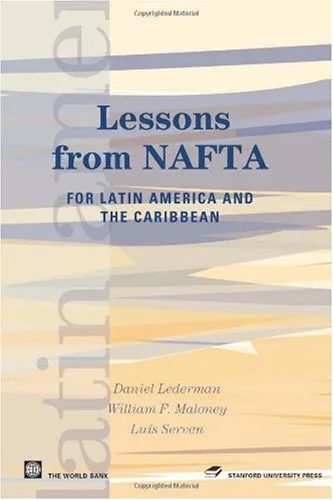The Political Economy of Protection: Theory and the Chilean Experience
4.0
Reviews from our users

You Can Ask your questions from this book's AI after Login
Each download or ask from book AI costs 2 points. To earn more free points, please visit the Points Guide Page and complete some valuable actions.In "The Political Economy of Protection: Theory and the Chilean Experience," renowned economist Daniel Lederman delves into the intricate interplay between economic theory and real-world practices, particularly as they pertain to trade protection mechanisms. By examining Chile's policy landscape, this book synthesizes theoretical insights with empirical data, presenting a comprehensive perspective on the political economy of trade protection.
Summary
The book is structured around a detailed analysis of the political economy surrounding protectionist trade policies, with a special focus on the Chilean experience. Lederman sets the stage with a theoretical exploration of protectionism, drawing on a myriad of economic theories that elucidate why nations might favor trade barriers despite the widely accepted economic benefits of free trade.
Lederman journeys into the heart of Chile’s economic transformation over the decades, highlighting a series of pivotal policy decisions that have shaped the country’s economic landscape. The narrative is not purely historical or theoretical; it is a blend of both, enriched by economic models and detailed case studies. Through meticulous research, Lederman examines how political forces and economic interests interact to drive policies that either open up or close off a nation to international markets.
Employing a rich array of data, the book examines the impacts of various protectionist strategies, evaluating their effectiveness in achieving intended economic outcomes. The Chilean experience serves as a microcosm through which broader economic and political theories can be tested and understood. This experience provides insights into the delicate balance policymakers must strike between domestic economic protection and international economic engagement.
Key Takeaways
- Intricate interaction between political agenda and economic policy.
- The consequences of protectionist policies on a nation's economy.
- The unique factors that contributed to Chile’s economic decisions.
- The theoretical underpinnings of protectionist strategies.
- Comparative analysis of global and Chilean economic frameworks.
- Lessons in policy-making from Chile's economic evolution.
Famous Quotes
“Protectionism, while seemingly a shield for the economy, often constrains opportunities for growth and development in the long run.”
“The Chilean experience offers a valuable lesson: economic policies that align closely with a nation’s political landscape can redefine the boundaries of progress.”
Why This Book Matters
"The Political Economy of Protection: Theory and the Chilean Experience" stands out as a critical text in understanding the dynamics of trade policies and their far-reaching impacts. The book’s importance lies in its ability to connect theoretical economic models with practical, country-specific examples. For policymakers, economists, and scholars, Lederman’s work offers not just a narrative of Chile’s policy decisions but also a roadmap for navigating the complexities of implementing trade policies within any nation.
The book’s insights bear relevance for global economic strategy and trade negotiations, making it a significant resource for understanding the broader implications of protectionist policies. In an era where international trade relationships are continually evolving, Lederman’s analysis provides clarity and guidance for future economic policies that can adapt and thrive amid these changes.
Free Direct Download
You Can Download this book after Login
Accessing books through legal platforms and public libraries not only supports the rights of authors and publishers but also contributes to the sustainability of reading culture. Before downloading, please take a moment to consider these options.
Find this book on other platforms:
WorldCat helps you find books in libraries worldwide.
See ratings, reviews, and discussions on Goodreads.
Find and buy rare or used books on AbeBooks.
1193
بازدید4.0
امتیاز50
نظر98%
رضایتReviews:
4.0
Based on 0 users review
"کیفیت چاپ عالی بود، خیلی راضیام"
Questions & Answers
Ask questions about this book or help others by answering
No questions yet. Be the first to ask!


